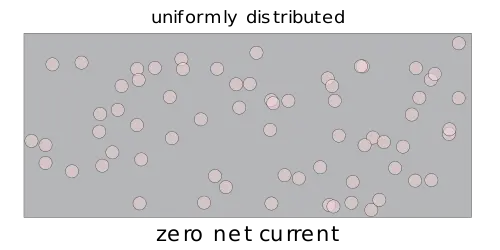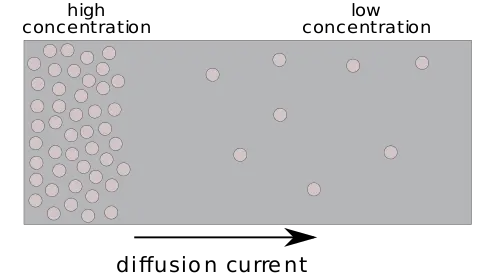| (One intermediate revision by the same user not shown) | |||
| Line 10: | Line 10: | ||
:[[File:diffusion current - high con.svg|500px]] | :[[File:diffusion current - high con.svg|500px]] | ||
| + | |||
| + | === Diffusion vs Drift currents === | ||
| + | {{see also|drift current}} | ||
| + | {| class="wikitable" | ||
| + | |- | ||
| + | ! || Diffusion current || Drift current | ||
| + | |- | ||
| + | | Result of || Having mass || Having charge | ||
| + | |- | ||
| + | | Due to || Carrier movement due to concentration gradient || Carrier movement due to electric field applying a force | ||
| + | |- | ||
| + | | Obey || [[Fick's law]] || [[Ohm's law]] | ||
| + | |} | ||
| + | |||
| + | == Theory == | ||
| + | Using [[Fick's law]], we ca related the diffusive flux to the concentration. | ||
| + | |||
| + | :<math>F = -D \frac{d \varphi}{d x} </math> | ||
| + | |||
| + | which, for electrons is | ||
| + | |||
| + | :<math>F_n = -D_n \frac{d n}{d x} </math> | ||
| + | |||
| + | and for holes is | ||
| + | |||
| + | :<math>F_p = -D_p \frac{d p}{d x} </math> | ||
| + | |||
| + | Where <math>D_n</math> is the electron diffusion coefficient and the <math>D_p</math> is the hole [[diffusion coefficient]]. Both are in cm<sup>2</sup>/s. | ||
| + | |||
| + | There are <math>n</math> free electrons per cubic meter of this material, each with have an [[elementary charge]] <math>q</math>. | ||
| + | |||
| + | Diffusion current density <math>J_n^{\text{diff}}</math> due to free electrons | ||
| + | |||
| + | :<math>J_n^{\text{diff}} = q D_n \frac{d n}{d x}</math> | ||
| + | |||
| + | While the current density <math>J_p^{\text{diff}}</math> due to holes is | ||
| + | |||
| + | :<math>J_p^{\text{diff}} = -q D_p \frac{d p}{d x}</math> | ||
| + | |||
| + | == See also == | ||
| + | * [[Drift current]] | ||
| + | * [[Stokes-Einstein Relation]] | ||
Latest revision as of 18:52, 23 November 2017
Diffusion current is current which occurs in response to concentration gradient. That is, diffusion current is the movement of charge carriers as a result of entropy ensuring that carriers move from a region of high concentration into regions of low concentration. This is in contrast to drift current which is a result of an applied electric field.
Overview[edit]
In a given material where particles are uniformly distributed within the lattice, charge carriers will roam around randomly due to thermal velocity of the material. However, due to the random collisions the net current will result in a net current of zero as the carriers do not really go anywhere.
In a material where particles are not entirely uniformly distributed, entropy will ensure that carriers in region of high concentration will move to regions of low concentration. The diffusion current is therefore the movement of those charge carriers as they diffuse.
Diffusion vs Drift currents[edit]
- See also: drift current
| Diffusion current | Drift current | |
|---|---|---|
| Result of | Having mass | Having charge |
| Due to | Carrier movement due to concentration gradient | Carrier movement due to electric field applying a force |
| Obey | Fick's law | Ohm's law |
Theory[edit]
Using Fick's law, we ca related the diffusive flux to the concentration.
which, for electrons is
and for holes is
Where is the electron diffusion coefficient and the is the hole diffusion coefficient. Both are in cm2/s.
There are free electrons per cubic meter of this material, each with have an elementary charge .
Diffusion current density due to free electrons
While the current density due to holes is

